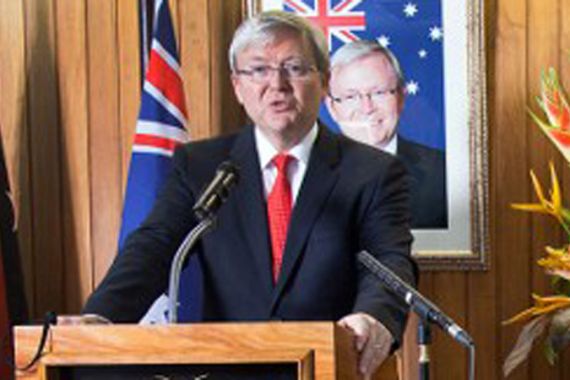Australia dumps unpopular carbon tax
Prime Minister Kevin Rudd plans to bring forward emissions trading scheme in policy overhaul ahead of election.

Australia’s government has moved to scrap its carbon tax and bring forward an emissions trading scheme a year earlier than planned.
Prime Minister Kevin Rudd said on Tuesday that he wanted the fixed price on carbon emissions to end on June 30, 2014.
Keep reading
list of 4 itemsTurtles swimming to extinction in Malaysia as male hatchlings feel heat
Could shipping containers be the answer to Ghana’s housing crisis?
Thousands protest against over-tourism in Spain’s Canary Islands
“The government has decided to terminate the carbon tax to help cost of living pressures for families and to reduce costs for small businesses,” he said.
A floating carbon price, or emissions trading scheme (ETS), that would be linked to the European carbon market, would start the following day.
Rudd said the change away from the unpopular tax would slash $3.5bn from the federal budget over the forward estimates period.
He said his government would make up the gap with savings of around $3.6bn from a range of measures.
Budget shortfall
The tax was due to raise $7.5bn in 2013-14, and $7.9bn in 2014-15.
Rudd said the policy change would see the cost of carbon permits fall from the planned $23.09 per tonne from July 2014 to about $5.50 per tonne, saving big businesses billions of dollars in carbon costs.
“This is the fiscally responsible thing to do,” Rudd said.
“The nation’s 370 biggest polluters will continue to pay for their carbon pollution, but the cost will be reduced, meaning less pressure on consumers.”
The move is expected to save Australian households an average of $349 a year, Rudd said. It would largely be in the form of lower energy bills.
The government will make up shortfall in the federal budget with cuts to other programmes, including scaling back funding for some environmental programmes.
Election focal point
The policy shift is set to become a focal point in an election likely to be held within weeks.
The carbon tax was enacted under the previous prime minister, Julia Gillard, who was ousted by Rudd last month in an internal Labor Party coup.
Rudd had been toppled as prime minister by Gillard in her own internal coup three years ago.
Gillard pushed through the tax in a bid to gain needed support from the minor Greens party, despite a campaign promise not to do so.
The government defended the move as a necessary weapon against climate change.
Australia is one of the world’s worst greenhouse gas emitters per capita because of its heavy reliance on massive coal reserves to generate electricity.
Backlash
The backlash from the public was intense, with some dubbing Gillard “Ju-liar”.
Conservative opposition leader Tony Abbott has repeatedly hammered Labor over the tax, using it to paint the ruling party as untrustworthy.
“All he’s done is simply brought forward Julia Gillard’s carbon tax changes by 12 months,” Abbott said.
Under Gillard, Labor looked set for an overwhelming defeat at this year’s elections. But recent polls suggest the race has tightened since Rudd took back the reins.
Gillard had set elections for September 14, although Rudd can hold them from August until November.
He has refused to publicly announce a date, but he said that there was not going to be a huge variation from September 14.